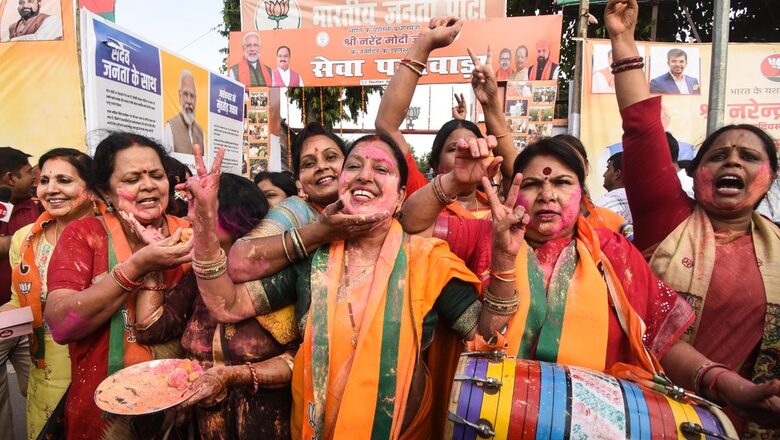
views
In tabling the ‘Nari Shakti Vandan Adhiniyam’, the latest iteration of the Women’s Reservation Bill, the Narendra Modi government has taken a positive step towards closing the political representation gap and sent out a message of hope at a time when women’s rights are under assault in many parts of the globe.
Significantly, the Constitution (128th Amendment) Bill, providing a 33 per cent quota for women in the Parliament and state assemblies, was the first to be tabled in the new Parliament building. It was, perhaps, a signal that the ground had shifted and a shake-up of the political establishment was imminent!
The PM’s empowerment initiative puts the Opposition in a tough spot, for three reasons. First, it cannot position itself on the wrong side of such an emotive issue, even though credit for the passage of the law will go entirely to the Modi government. For instance, Bharat Rashtra Samithi (BRS) leader K Kavitha, who has been lobbying for the Bill, has no choice but to welcome it.
Second, the wind has been taken out of the INDIA company’s ‘democracy in danger’ campaign. The government’s stated commitment to furthering gender parity in political representation is eminently progressive, liberal and in keeping with the tenets of democracy. And like the government’s welfare schemes, it benefits women of all castes and communities.
Third, the women’s vote is now a potent force in electoral politics. In the 2019 general elections, the gender gap was not only bridged but reversed, with 67.18 per cent of women participating as opposed to 67.01 per cent of men. For some Opposition leaders, such as Nitish Kumar and Mamata Banerjee, the women’s vote is all-important. If the Bill becomes law, the BJP will have the ‘W’ factor advantage.
That the prime minister means business is evident from his characterisation of the Bill as an ‘agni pareeksha (trial by fire)’ for the ruling BJP. Party MPs who are privately opposed to the Bill for fear of losing their seats have been warned that they must fall in line, even if that means voting against their own self-interest. Fortunately, implementation is a long way off, so the fallout will be visible only in 2029.
The debate will be interesting, going by past experience. Ever since the Deve Gowda government introduced the Bill in 1996, every government has tried to push it through – in 1996, 1998, 1999, 2002, 2003, 2008 and 2010. But the closest it ever came to becoming a law was its passage in the Rajya Sabha in 2010 (only to lapse thereafter).
Each time, it was held up for lack of consensus, which goes to show that consensus is overrated at times. Opposition to the Bill came largely from OBC MPs, who felt it ought to provide a quota within a quota for certain categories. The current iteration provides reservations for SCs and STs; for obvious reasons, it cannot do so for backward castes.
The other argument, that the reserved seats would go to the wives, mothers, sisters or daughters of political families, has some basis. The same argument was made vis-a-vis reservation of seats for women in panchayats and local bodies (initially 33 per cent, now 50 per cent in most states) in 1993. However, despite the ‘sarpanchpati’ culture, political awareness among women has increased over time. Studies testify to the vital role played by reservation in improving the political participation of women and combatting patriarchal attitudes.
Globally, the Inter-Parliamentary Union (IPU) pegs the representation of women at 26.5 per cent. Only six countries have achieved or exceeded gender parity in this regard. India, with representation at 15.1 per cent, stands 140th in a list of 186 countries, behind Pakistan, Nepal and Bangladesh. Likewise, in the World Economic Forum’s Gender Gap Index, India is 127th in a list of 146 countries. If it is to improve its position, the Women’s Reservation Bill must become law.
The fragility of women’s rights became evident when the Supreme Court of the United States rolled back Roe vs Wade, which guaranteed the legal right to abortion, in June 2022. Poland, too, has severely restricted the reproductive rights of women. In Afghanistan, women have been progressively stripped of virtually all their rights. In Iran, anti-hijab protests have resulted in the government mooting a mandatory hijab law that proposes a ten-year sentence for violators.
India’s initiative is all the more important against this backdrop. Political parties must, however, ensure that it does not become a tokenism. On no account should women be excluded altogether from general (unreserved) seats.
Some political parties have already made important strides in furthering the representation of women in electoral politics, the Trinamool Congress (TMC) and Biju Janta Dal (BJD), for example. The BJP, sadly, has not been one of them. For all too long, there has been a disconnect between the grassroots mobilisation of women by the RSS-BJP and their participation in electoral politics. It’s time for the BJP to change that, and lead by the power of example.
Bhavdeep Kang is a freelance writer and author of ‘Gurus: Stories of India’s Leading Babas’ and ‘Just Transferred: The Untold Story of Ashok Khemka’. A journalist since 1986, she has written extensively on national politics. Views expressed in the above piece are personal and solely that of the author. They do not necessarily reflect News18’s views.




















Comments
0 comment